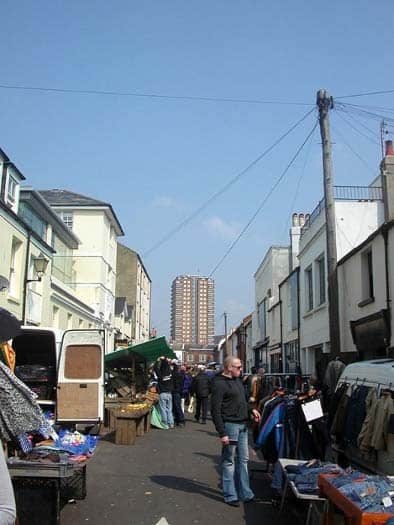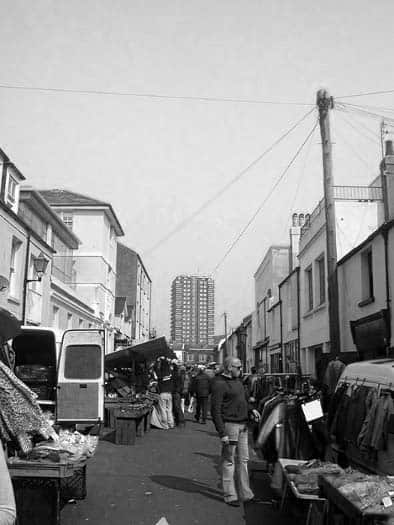Whenever I wander along Upper Gardner Street in the North Laine I get that Proustian rush, that time and place thing. For Proust it was smells and tastes, for me it’s the colourful local architecture and that central Brighton bohemian vibe which is pretty much unchanged since I first arrived here in 1979.
It was a time of massively high unemployment (Thatcher had come to power that year, go figure…) but I was miraculously offered a job shortly after graduating as a supervisor on the Government’s Youth Opportunities Scheme, known back then as YOP.

Upper Gardner Street, 1980s
The money was poor, but I thought here was a chance to give something back to the community, helping out these kids who were deemed unemployable. Most had left school at 15, as you could back then.
Some of their own volition, but most because they were thrown out, had been branded as trouble-makers. Most came from broken homes in the problem areas of Brighton. But one thing they all had in common was that they wanted to belong somewhere, to be part of something. Be part of the world of work, where they could transition from boys to young men.
I had a gang of around 15 boys in all, with a brief to go out into the community and do up dilapidated buildings which could then be used by local people. Most of the work was straight forward painting and decorating, and the boys were given a small wage each week, more or less equivalent to today’s minimum wage. It was designed to be a learning experience and help prepare them to enter the work force.
Every day we’d go out in a transit-type van, descending noisily onto whatever project we happened to be engaged in. Sometimes the boys would moon out of the windows at startled passers-by, and as their boss I was supposed to be unamused. But it was a laugh, and we bonded.
Lunch times were a challenge. The boys were supposed to bring a packed lunch, but many didn’t because there wasn’t anyone at home to prepare them.
One boy, Trevor, often missed out on food altogether, having to scavenge what he could from his reluctant peers. One day he did, to my surprise have a modest lunch box with him. This unusual development was the subject of much speculation by the other boys. What was in Trevor’s sandwiches? You don’t want to know. That kind of thing.
We were at the time giving the old Brighton Boys Club in Upper Gardner Street a lick of paint, and all was going well. The boys were – by and large – hard-working and keen, until Trevor suddenly announced he had had enough, was starving, and was going to have an early break.
Off he went to get his tupperware container, and he tore into one of his sandwiches. It may have been spam, I can’t recall. What I can recall is that it was far too early for a break, being around 12 noon and, starving or not, lunch time was never before 1pm.
With 15 boys – all ravenously hungry seemingly all the time – it was important to keep to the routine. So I asked Trevor to put the sandwich away until 1pm, when we could all eat.
“No”, he said, glaring at me like a feral dog protecting a bone. “Fuck off. You can’t make me”.
“Trevor, please put the sandwich away, or I’ll have to send you off for the rest of the day. You’ll lose half a day’s money, and you could lose your job here place on the scheme”.
He looked at me. “I mean it”, I said, trying to sound more authoritative than I felt.
Trevor, who had severe learning difficulties and an absentee mother who was known to be a working prostitute, was a strong kid with a shock of bright red hair and a face bedecked with large freckles.
He leapt up, furiously tearing at the remains of the sandwich, and with a wild growl seized a fire extinguisher from the wall.
“Put it down, Trevor”, I said.
But Trevor was determined to show who was the boss, and instead of putting the extinguisher down, lifted it above his head and stumbled towards me, snarling, trying to catch his breath.
“I… WANT… TO… EAT… MY… FUCKING….SANDWICH“.
The other boys found this hugely entertaining, and there were shouts of “Do ‘im Trev, go on, do ‘im”.
It was as if I’d walked inadvertently into a dog fighting ring, and Trevor, playing to an enthusiastic crowd, strutted like a victorious gladiator in a particularly bloody arena.
Looking back now, I can tell you that all my romantic notions of doing something real and putting something back into the community left me. I wasn’t much older than those kids and I was about to sustain perhaps a severe head injury.
It didn’t seem worth it. Fortunately, even in his temporary fury, the heat of Trevor’s rage, my assuring him he would be locked away for a good while if he went ahead with the attack managed to seep through. I held my ground and talked Trevor down.
There were no mobile phones to call the police, and it was with great relief that I warily watched a panting Trevor lower the extinguisher to the floor.
I resolved not to let the incident put me off my job. But in truth it was never the same again. The trust had gone.
Having reported back to my boss on the episode, Trevor was quietly removed from the programme. I recall him mournfully taking his leave of our base camp, never to return.
Whenever I wander along Upper Gardner Street I wonder to this day where Trevor and all those other boys are now. Did they ever make it into the work force proper, did they grow up to have families and ideals of their own? Or did the hand they were dealt simply mute all enthusiasm for life, take away any desire to progress in the world of work.
Did they ‘do battle with the world ‘ere all eternity,’ as Sophocles might have it.

